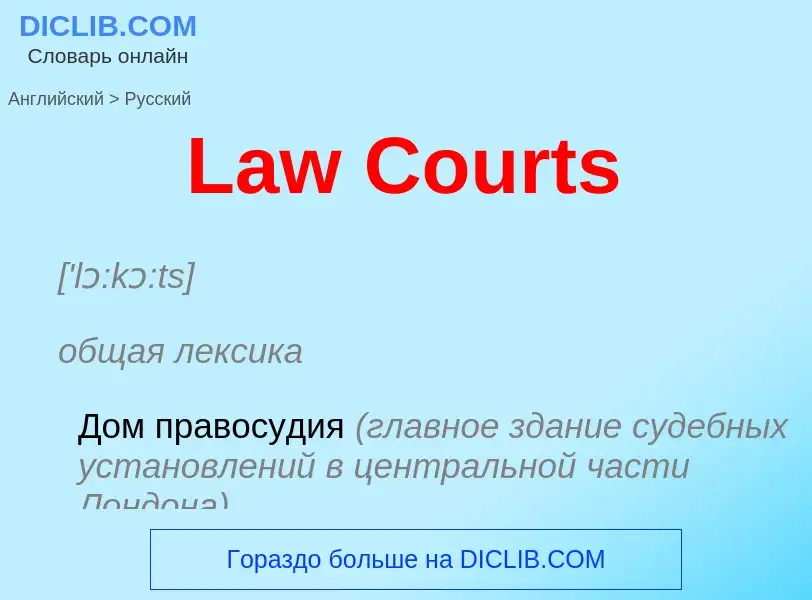Traduzione e analisi delle parole tramite l'intelligenza artificiale ChatGPT
In questa pagina puoi ottenere un'analisi dettagliata di una parola o frase, prodotta utilizzando la migliore tecnologia di intelligenza artificiale fino ad oggi:
- come viene usata la parola
- frequenza di utilizzo
- è usato più spesso nel discorso orale o scritto
- opzioni di traduzione delle parole
- esempi di utilizzo (varie frasi con traduzione)
- etimologia
Law Courts - traduzione in russo
['lɔ:kɔ:ts]
общая лексика
Дом правосудия (главное здание судебных установлений в центральной части Лондона)
['lɔ:kɔ:t]
общая лексика
суд
Definizione
Wikipedia

A court is any person or institution, often as a government institution, with the authority to adjudicate legal disputes between parties and carry out the administration of justice in civil, criminal, and administrative matters in accordance with the rule of law. In both common law and civil law legal systems, courts are the central means for dispute resolution, and it is generally understood that all people have an ability to bring their claims before a court. Similarly, the rights of those accused of a crime include the right to present a defense before a court.
The system of courts that interprets and applies the law is collectively known as the judiciary. The place where a court sits is known as a venue. The room where court proceedings occur is known as a courtroom, and the building as a courthouse; court facilities range from simple and very small facilities in rural communities to large complex facilities in urban communities.
The practical authority given to the court is known as its jurisdiction (from Latin iūrisdictiō, from iūris, "of the law," + dīcō, "to declare," + -tiō, noun-forming suffix), the court's power to decide certain kinds of questions or petitions put to it. According to William Blackstone's Commentaries on the Laws of England, a court (for civil wrongs) is constituted by a minimum of three parties: the āctor or plaintiff, who complains of an injury done; the reus or defendant, who is called upon to make satisfaction for it; and the jūdex or judicial power, who is to examine the truth of the fact, determine the law arising upon that fact, and, if any injury appears to have been done, ascertain and by its officers apply a legal remedy. It is also usual in the superior courts to have barristers, and attorneys or counsel, as assistants, though, often, courts consist of additional barristers, bailiffs, reporters, and perhaps a jury.
The term "the court" is also used to refer to the presiding officer or officials, usually one or more judges. The judge or panel of judges may also be collectively referred to as "the bench" (in contrast to attorneys and barristers, collectively referred to as "the bar").
In the United States, the legal authority of a court to take action is based on personal jurisdiction over the parties to the litigation and subject-matter jurisdiction over the claims asserted.


![The [[International Court of Justice]] The [[International Court of Justice]]](https://commons.wikimedia.org/wiki/Special:FilePath/Grand Hall de Justice de Palais de La Paix à La Haye Pays-Bas.jpg?width=200)
![The building of the [[Supreme Court of Estonia]] in [[Tartu]] The building of the [[Supreme Court of Estonia]] in [[Tartu]]](https://commons.wikimedia.org/wiki/Special:FilePath/Riigikohus.jpg?width=200)
![A courtroom of the [[Supreme Administrative Court of Finland]] A courtroom of the [[Supreme Administrative Court of Finland]]](https://commons.wikimedia.org/wiki/Special:FilePath/Supreme Administrative Court of Finland 20180915 125125.jpg?width=200)
![A courtroom of the [[Permanent Court of Arbitration]] A courtroom of the [[Permanent Court of Arbitration]]](https://commons.wikimedia.org/wiki/Special:FilePath/Une des salles de réunion de la Cour permanente d'arbitrage.jpg?width=200)
